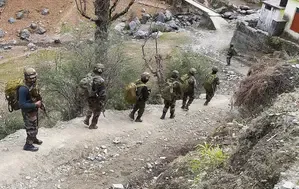What Triggered the Search Operation in J&K’s Rajouri?

Synopsis
Key Takeaways
- Search operations are ongoing in Rajouri and Poonch.
- Security forces are actively pursuing suspected terrorists.
- A ceasefire agreement remains in place but is fragile.
- Civilians continue to face significant hardships in the conflict.
- Joint operations are intensifying against terrorism in J&K.
Jammu, May 19 (NationPress) A comprehensive search operation has been initiated in the Rajouri district of Jammu and Kashmir on Monday following reports of suspicious movements in the border region, as confirmed by officials.
Security forces commenced this operation in response to alerts regarding potential threats in the border belt of Rajouri.
Additionally, a separate search operation is currently underway in the forested areas of Poonch district.
According to an official, the Rajouri operation was launched after a woman reported seeing three suspicious individuals in the Nowshera area late Sunday night.
In a related development, the J&K Police apprehended two terror associates in the Shopian district on Monday, seizing arms and ammunition.
"In a significant anti-terror operation, a joint checkpoint involving SOG Shopian, CRPF 178 BN, and 34 RR led to the arrest of two suspects," stated the Shopian police via a post on X.
"During the search, authorities recovered four hand grenades, two pistols, 43 live rounds, and other incriminating evidence, leading to an FIR being filed."
Joint forces have intensified their operations against terrorists, their overground workers (OGWs), and sympathizers throughout J&K.
These operations are being executed collaboratively by the army, police, and various security forces. Just last week, six terrorists were neutralized in consecutive operations in the Shopian and Pulwama districts.
Among those killed was the operational commander of LeT.
On April 22, LeT terrorists claimed the lives of 26 civilians, including a local, in the Baisaran meadow of Pahalgam, segregating victims based on religion.
In retaliation, the Indian government has not only pursued various diplomatic actions against Pakistan but has also conducted precision strikes targeting terrorist bases deep within Pakistan, including locations such as Muridke near Lahore, Kotli, and Muzaffarabad in Pakistan-occupied Jammu and Kashmir (PoJK).
In response, Pakistan has engaged in indiscriminate mortar shelling along the line of control (LoC) and the international border (IB) in J&K.
Over 200 residential and commercial structures have been devastated due to Pakistan's mortar attacks on civilian infrastructure in the districts of Poonch, Rajouri, Baramulla, and Kupwara.
Many residents from the border regions have been compelled to flee their homes, livestock, and farmland. These unfortunate civilians are still struggling to return to their villages as security forces continue to neutralize unexploded mortar shells in the border areas.
On May 12, the Director Generals of Military Operations (DGMOs) from both nations reached an agreement for a ceasefire, resulting in a cessation of hostilities on both sides. This ceasefire remains intact, although India has made it clear that this understanding will persist only as long as Pakistan refrains from allowing terrorist activities against India from its territory.









